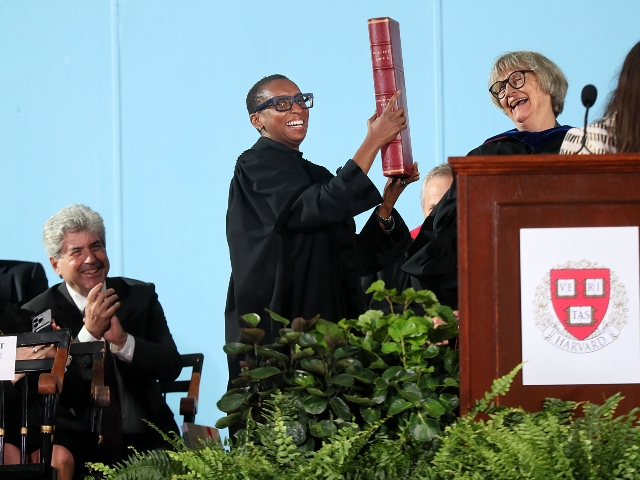
Harvard’s plagiarism problem continues as the spotlight shines on other faculty members at the Ivy League university in the wake of the school’s former president, Claudine Gay, being ousted amid dozens of plagiarism allegations being unearthed and multiple antisemitism scandals.
Plagiarism allegations against Harvard Extension School DEI administrator Shirley Greene involving more than 40 passages of her 2008 dissertation have been filed with the Ivy League institution, according to a report by City Journal.
This comes after disgraced president Claudine Gay resigned earlier this year in the wake of a slew of plagiarism allegations that resulted in her having to make seven corrections across two articles and her Ph.D. dissertation.
Moreover, Harvard University Chief Diversity Officer Sherri Ann Charleston was also accused of plagiarism in a new complaint, which alleges that Charleston claimed credit for her husband’s work.
Additionally, top cancer researchers at Harvard have been recently accused of scientific fraud affecting 37 studies. The researchers are also accused of manipulating data images with simple methods such as copy-and-paste and Adobe Photoshop.
As for the latest allegations against Greene, who is a Title IX coordinator affiliated with the Office for Gender Equity, she has worked to advance the concept of so-called “Diversity, Inclusion, and Belonging.”
The full complaint, obtained by City Journal, raises serious questions about Greene’s scholarship and academic integrity.
In one instance, Greene appears to take words, phrases, passages, and almost entire paragraphs verbatim directly from academic Janelle Lee Woo’s 2004 dissertation, “Chinese American Female Identity,” without including appropriate attribution or quotation.
In Woo’s dissertation, she writes the following:
Stage 2, White Identification (WI), is a direct consequence of the increase in significant contact between the individual and white society. This stage entails the sense of being different from other people and not belonging anywhere. The individual’s self-perception changes from neutral/positive to negative, and she begins to internalize the belief systems of white society. Consequently, the individual does not question what it means to be Asian American. The individual alienates herself from other Asian Americans, while simultaneously experiencing social alienation from her white peers. Only when the individual seeks to “acquire a political understanding of [her] social status” (Kim 1981: 138) does she enter into the next stage.
Greene’s work, meanwhile, reads as follows:
White Identification (WI), is a direct consequence of the increase in significant contact between the individual and white society. Individuals in this stage have the sense of being different from other people and not belonging anywhere. Their self-perception changes from neutral/positive to negative and they begin to internalize the belief systems of white society. Consequently, the individual fails to question what it means to be Asian American and alienates themselves from other Asian Americans, while simultaneously experiencing social alienation from their white peers. In order to move to the next stage, the individual must acquire a political understanding of social status.
While the duplicated sections of Woo’s work are italicized, proper citation was not included.
Greene also reportedly lifts most of an entire table on “Racial/Ethnic Identity Development Models” without acknowledging the source.
Another example in the complaint compares Greene’s dissertation with a passage from “Developing Leadership Skills for Diversity” by Anthony Antonio.
A section of Antonio’s paper reads as follows:
Astin found that independent of students’ entering characteristics and different types of college environments, frequent interracial interaction in college was associated with increases in cultural awareness, commitment to racial understanding, commitment to cleaning up the environment, and higher levels of academic development (critical thinking skills, analytical skills, general and specific knowledge, and writing skills) and satisfaction with college.
A section of Green’s dissertation, meanwhile, reads as follows:
Astin found that independent of students’ entering characteristics and different types of college environments, frequent interracial interaction in college was associated with increases in cultural awareness, commitment to racial/ethnic understanding, commitment to cleaning up the environment, and higher levels of academic development (critical thinking skills, analytical skills, general and specific knowledge, and writing skills) and satisfaction with college.
While Greene cited the source, she failed to include quotation marks. Notably, the entire paragraph is copied verbatim, with only the word “ethnic” being added to it.
The complaint reportedly calls out more than three dozen other examples of Greene allegedly taking language from other scholars. The allegations range from small violations to what appears to be the blatant stealing of others’ work.
You can follow Alana Mastrangelo on Facebook and X/Twitter at @ARmastrangelo, and on Instagram.

